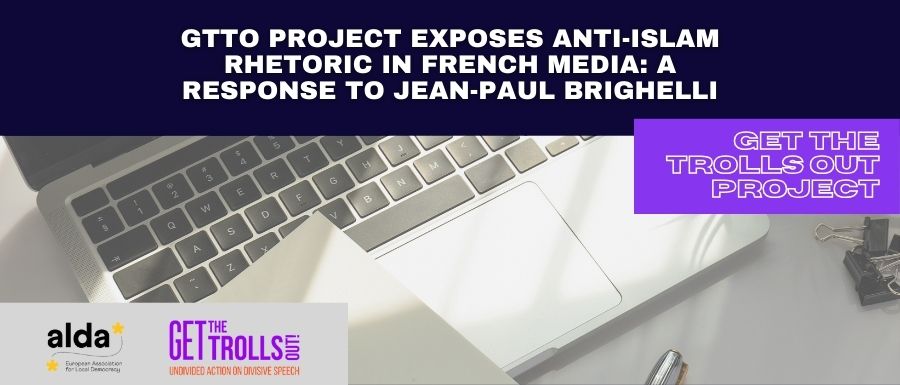As part of the Get The Trolls Out project—an initiative aimed at countering hateful narratives in media and online spaces that fuel fear and division—ALDA works to identify and address negative portrayals of Judaism, Islam, Christianity, and other religions in traditional and digital media across the French landscape.
In this context, a recent article published by Valeurs Actuelles, a French newspaper known for its hardline stance against migrants and Islam, included selected excerpts from essayist Jean-Paul Brighelli’s latest book.
In “L’École sous emprise”, former teacher Jean-Paul Brighelli criticizes a supposed “morality police” within French schools, which he claims allows fanaticism and Islamism to thrive, with detrimental effects on the intellectual and social development of children.
The excerpts chosen by Valeurs Actuelles and much of Brighelli’s commentary rely on familiar anti-Islam tropes—precisely the kind of narratives that the Get The Trolls Out project aims to challenge and debunk.
Jean-Paul Brighelli, French schools, and Islam
Jean-Paul Brighelli regularly contributes to the anti-system media, such as Marianne (traditionally left-wing), Front Populaire, Boulevard Voltaire, or Valeurs Actuelles (right-wing). He directs most of his criticism at the French school system which, according to him, “tells lies from nursery school right up to the Capes exam,” and is led by “morons.”
Brighelli explores several solutions to this problem in his books, from a return to morality and order in classrooms, to adding special provisions against Islam under the law on the separation of the State and religions.
In his most recent work, Jean-Paul Brighelli expands on the supposed influence of Islam in schools. The content of the pamphlet can be summarised in three points:
- Islamism has infiltrated French schools,
- “Woke” ideas justify religiously motivated violence,
- Schools and teachers must be stricter to counter this “school jihad”.
Furthermore, Jean-Paul Brighelli cites recent criminal events (that have, for the most part, nothing to do with schools) to justify his arguments and viewpoints. For instance, the selected excerpts mention the aggression of a girl on a school bus in Achenheim for not behaving according to Ramadan rules, or how another girl was beaten in Montpellier for wearing “European” clothes. These events, Brighelli says, create a climate of fear and tension that favours the rise of Islamism in French schools.
This method of using “various events” to call for political decisions is fundamentally flawed: it does not address the root causes of the problems at hand and oversimplifies complex situations.
Furthermore, the author mixes various concepts – religion, gender issues, crime, the schooling system, wokism, feminism etc. – have about as much to one another as Brighelli has with decency. In a single paragraph, Brighelli pretends that the “intersectionality of struggles [assumes] that a woman raped by a Muslim should not lodge a complaint on the risk of being considered racist [and commands that] the veil is wrong in Iran, but it’s right [in France]”. For a former teacher, we could have expected more nuance in his words.
The myth of “Cultural incompatibility”
Brighelli, like many a writer from the right-wing nebula, falls culprit of using some well-known — and well debunked — tropes of anti-Islam hate speech.
Mainly, that Islam is incompatible with Western values and society. This belief warns that traditional Western values are at the risk of disappearing if Western countries attempt to accommodate immigration from Muslim-majority countries.
However, this belief negates the long history of Muslims in Western societies, from their contributions to academic disciplines and culture, to their presence in Europe for generations.
Finally, Brighelli inaccurately delivers an analysis that is solely based on isolated violent events, some of which have nothing to do with schools, but only contribute to the stigmatisation of Muslims and migrants.
Reception of Jean-Paul Brighelli’s book
However problematic the ideas of Jean-Paul Brighelli are, the author’s influence seems rather slim in French media. Jean-Paul Brighelli appears on several occasions in anti-establishment, anti-migrant, and anti-Islam media such as Valeurs Actuelles, Boulevard Voltaire, or Marianne. But apart from a video interview with Le Figaro (centre-right) a month ago, his book remained largely confidential.
However, this is not to say that his ideas are not shared by others.
This article by Valeurs Actuelles is very much an example of how the far-right nebulae sees Islam, migration, and progressive ideas: problems that will ultimately lead to the demise of traditional Western values and the victory of Islamism over France.
But projects like Get The Trolls Out will continue to identify and report on similar religious-based hate speech incidents, and most importantly, advocate for and empower people to fight against hate in our societies.
For more information on GTTO or its partners, click here!
